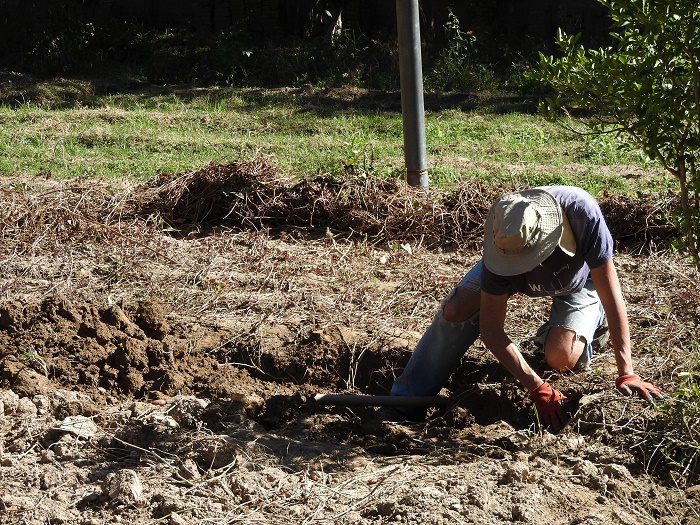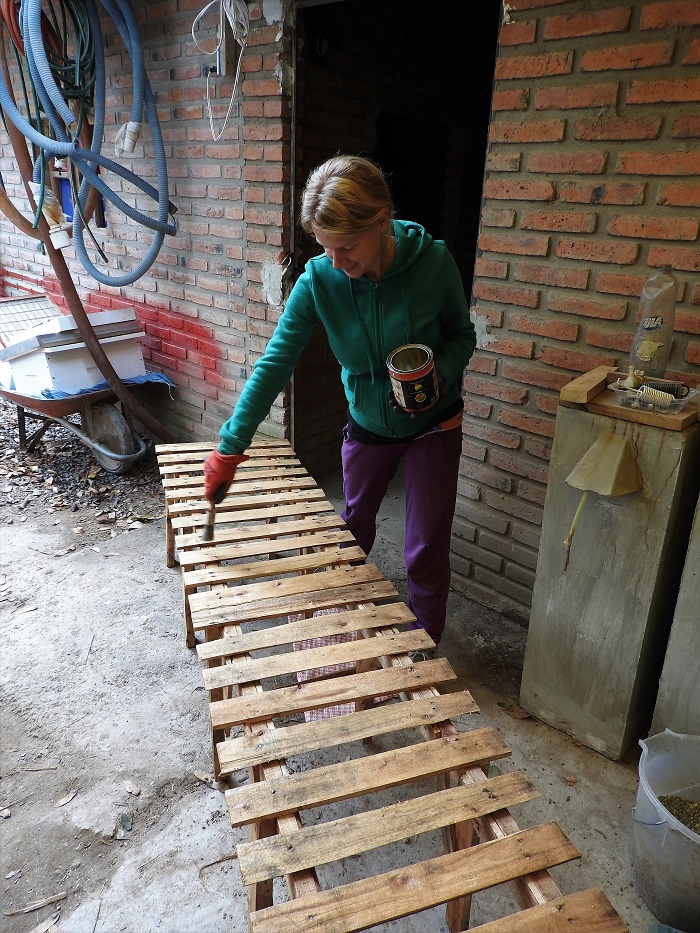

ExChange The World – Clean Water and Sanitation
by Anna Książek and Andrea Pucci on the 11/05/2021
This blog was originally written for ExChange The World.
Find out more about at Sustainable Development Goal 6, Clean Water and Sanitation.
Bolivian Oasis
OASIS BOLIVIANO | Bolivia
Being on the bus from Santa Cruz to Sucre, we asked the driver to leave us around 40 km before the city. He looked at us surprised – we were in the middle of nowhere. A valley surrounded by mountains, a small river and few houses here and there. We took our bags and started to look around. According to the instructions we should cross a bridge and walk for 1 km. But we were not completely sure where the bridge was, and people around did not really speak Spanish, their main language is Quechua. Finally, we managed to find the way and after 20 minutes we knocked on the door of Oasis Boliviano.
The idea of doing eco-, agro-, rural tourism goes back many years in time. - says Trevor, founder of Oasis Boliviano - In 2000 we went with my family to the Swiss Alps to visit our relatives. We stayed a couple of weeks on their farm, impressed by the rural life and its quietness. We thought we should live more like that. For many years after, though, we were still very tightly linked to the city. Finally, in 2006, I came to Bolivia for the first time. I lived and worked in rural communities in Eastern Bolivia, introducing the idea of filters for clean water. Then, a few years after, I found Gingers Paradise: a rural tourism project in which a family set up a little guest house. They had their own garden and dairy cows. I was really impressed, it seemed to me they were living a very sustainable lifestyle, yet they had a fairly successful business. They were also exposing other people to new ways of thinking, doing things, demonstrating sustainable gardening, solar energy, etc. It really inspired me. I spent the next few years living in the city, working at the university, trying to change the system from within. I found it very frustrating and I didn't see how I could continue that path, especially since I got married and formed a family. In this context, I started to think about how I really want to live, how I want to raise my children. By chance, my mother at the same time wanted to change something in her life. I pitched to her the idea of working together on a version of Ginger´s Paradise. We chose a place close to Sucre, so my daughters could be close to their mothers´ family, and that's how it started, back in 2015. It's been almost 2,5 years.
The primary focus during that time was to build a strong connection with the local community. Trevor learned Quechua and shared with the community the idea of water filters.

Picture: Bolivia, June 2018. Andrea Pucci helping to grow the garden in Oasis Boliviano, an ecological hostel close to Sucre in Bolivia.
We implemented a pilot water project with community members. It was a very interesting learning process, and a great opportunity to get to know people. They were coming to our garden to build their own filters, but they also had to cover the cost of the materials. If they didn't have money in at the time we could also organize a barter. We had someone who arranged to pay us with papayas, so for a few weeks he would come with papayas and we would keep track of how many we need to pay for the filter. Another guy painted the house, etc. We could see what villagers were producing, what skills they had. Also, today, as we are learning more about tourism services, we always try to hire locals as guides, teachers, cooks. It's a very good experience but there are also a lot of challenges. We have a different attitude toward schedule and time, some people want to spend more time with their family and are not interested in paid work. But we are slowly getting things done.
Although they have had guests coming for almost two years, the big promotion is only about to start. They've experimented with different models, they learned a lot, they put a huge effort into making Oasis Boliviano as sustainable as possible. They have a garden and chickens, trying to produce their own food, collect rainwater and make it drinkable with filters, they have a functioning compost system, including dry toilets, they have slowly started with bio-construction. A big part of the work was done by interns and volunteers like us, who, as we could read in their references, loved the place and the idea behind it. Trevor himself, besides managing the hostel, is involved in thousands of other actions.
My background is in environmental science, especially in water, and this valley is facing a lot of water issues. I ended up getting drawn into some of those issues affecting our community as well as other communities which depend on the river in terms of irrigation. For the last 8-9 months I've been part of a committee assigned to not only look after the river but in general tackle environmental issues for 72 Quechua-speaking communities, which is a fairly significant responsibility. Trying to balance that with running a business and being a good father has been pretty difficult. I had to learn about local politics and the organizational structure of the union of agriculture producers, about Bolivian environmental law, and power, and politics, and influence, and press releases... a lot of stuff that I didn't want to be part of. But it's really a fight for the future of this valley. There are some people who want to turn all this area into a mining region. That will make the river too polluted to continue to use to irrigate crops. The area here is pretty dry, so it's difficult to imagine other solutions for irrigation. Luckily, we are not facing a really big mining company, things could be much more complicated. But it's still pretty difficult. The government is pro-mining. It seems they want to open as many mines as possible and as quickly as possible, ignoring the part of the constitution that speaks about indigenous rights, clean water and the environment.
.JPG)
Picture: Bolivia, June 2018. System for cleaning grey water built by Trevor Hirsche in Oasis Boliviano.
Despite all challenges, it seems there is a big chance that the action of protecting the river and preventing the mine can be successful. And that's what actually motivates Trevor to keep going.
I've been very aware of environmental challenges for a long time. When I was living in Canada, where I'm from, I was bombarded by information and campaigns, but it was very difficult to see where to start to make a change. There were issues like tropical deforestation that made me really passionate, but I was so far away from the issue, I didn't know what to do about it. I felt powerless. In Bolivia, there are so many challenges to overcome. I have the sense I make more of a difference here than I was doing in Canada. I'm motivated by the fact that I see signs that what I'm doing is having some impact here. I don't feel it is huge yet, but I see we are on the right track. It's really gratifying to be able to take things I'm interested in theory and put them into practice, observing what the result could be.
Another important share in motivation, and crucial factor in making a change according to Trevor, are actually hands-on actions.
It's so important to work with your hands. I think that in the modern industrial society we are taught to rely on machines, we barely do anything ourselves. If we want to live more locally, depend less on the system, and build alternatives, we have to do something more tangible with our hands. Gardening is what I mostly think about, as well as learning about medicinal plants, but also learning how to make your clothes, build furniture, there are so many things you can do yourselves so you don't depend on cheap, low-quality items from the market. Today I'm getting my hands dirty much more than I used to in terms of actually working in the soil, in the garden, learning more about sustainable production. In the process of doing that I really start to have a deeper understanding of nature. I spent so many years at the university studying environmental science. But it's so much different to look at it in the lab or on textbooks or go to the river to take samples than actually living by the river, watching it change over time, using it to irrigate... I feel so much more connected to nature.
Bolivia is definitely a great place to reconnect with nature. But it's also an amazingly interesting country from a cultural and political point of view.

Picture: Bolivia, June 2018. Anna Książek volunteering in Oasis Boliviano by building the benches from locally available materials.
I came to Bolivia 11 years ago. For a long time, I was very intrigued by pre-Colombian and pre-Incan civilization. Bolivia is fascinating for its indigenous cultures and archaeological sites. Then I got also interested in the political situation, firstly by the Water Wars, which happened around Cochabamba, where massive protests of people managed to convince the government to take a water distribution from a transnational corporation and give it to cooperatives run by citizens. Then, Evo Morales was elected president. He was connected to the Water War, and he was an indigenous leader. In the beginning, his program talked so much about the environment, but not from a Western perspective, which treats the environment as an object, something foreign to us. In Western universities you can learn about the environment, how to protect it, how to manage resources and things like that, but it's all very cold and... calculated, far from any emotional or spiritual connection. What Evo Morales used to talk about, Mother Earth or Pachamama, even using this indigenous word to express the idea, gave me the feeling that he was connected to very deep ancestral knowledge of nature and he based his government policy on that, which seemed to me to be truly amazing.
Evo Morales didn't really meet this initial expectation, and things in Bolivia are not going well from an environmental point of view. Industrialization and businesses found their ways. To stop them, we need something more than speaking. We need to be able to listen, work together and envision alternative futures.
One of the crucial skills in making a change is listening. It's very important to learn from indigenous people, learn from local knowledge. In order to present alternatives to the mainstream way of doing things we have to understand how the other side is thinking and perceiving things. That would help us to build a vision. Coming back to the mining issue: it's not enough for us to say we don't want mines here, because mines represent in some way economic growth and jobs for certain people. We have to show we can achieve at least some of these benefits without destroying the environment. For example, how can we envision a future for this valley based on sustainable agriculture complemented with eco-agro- tourism?
Whatever the vision, it cannot be implemented by individuals. We need a common effort.
I don't think there is much we can do as just one person. If you want to make a difference... look at what is out there, what movements have already started, where you think you can add something. It's a lot easier to join a movement that is already on the way, than starting something fresh. In the process you learn a lot, you connect with like-minded people, get energy and motivation. For quite a long time I was surrounded by people who were kind of apathetic until one and half years ago I decided to recruit workaway volunteers. I started to get groups of skilled, idealistic young people who were really interested in working and making a positive change. Till that moment I was used to having conversations around why we should change things and with these folks, conversations become more like: ok, we all agree we have to find alternatives for capitalism. How do we actually make it work? I think that it's a lot easier to stay motivated when you connect to groups of people who are on the same path.
Picture below: Bolivia, June 2018. International volunteers and local workers of Oasis Boliviano share the lunch prepared from local, seasonal ingredients.

0 comments
No comments on this blog yet. Would you like to be the first?